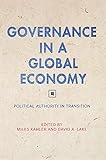Governance in a Global Economy : Political Authority in Transition / ed. by Miles Kahler, David A. Lake.
Material type: TextPublisher: Princeton, NJ : Princeton University Press, [2021]Copyright date: ©2004Description: 1 online resource (512 p.) : 19 line illus. 28 tablesContent type:
TextPublisher: Princeton, NJ : Princeton University Press, [2021]Copyright date: ©2004Description: 1 online resource (512 p.) : 19 line illus. 28 tablesContent type: - 9780691234687
- Corporate governance
- Globalization -- Political aspects
- International business enterprises -- Government policy
- International business enterprises -- Management
- POLITICAL SCIENCE / International Relations / General
- Accountability
- Bank for International Settlements
- Business economics
- Capital control
- Capital cost
- Capital gain
- Capital market
- Capitalism
- Central bank
- Competition (economics)
- Consumer organization
- Consumption (economics)
- Corporate capitalism
- Corporate governance
- Corporate social responsibility
- Currency
- Decentralization
- Developed country
- Economic Life
- Economic cost
- Economic development
- Economic geography
- Economic globalization
- Economic history
- Economic integration
- Economic interventionism
- Economic liberalization
- Economic model
- Economic planning
- Economic policy
- Economic problem
- Economics
- Economy and Society
- Economy
- Environmental economics
- Euromarket
- Externality
- Financial World
- Financial capital
- Financial market participants
- Fiscal policy
- Foreign direct investment
- Free trade debate
- Global Exchange
- Global Finance (magazine)
- Global Policy
- Global financial system
- Global governance
- Global production network
- Global warming
- Globalism
- Globalization
- Governance
- Hedge fund
- Index Of Economic Freedom
- Industrialisation
- Industry self-regulation
- Institute of International Finance
- Institution
- Institutional economics
- International Financial Reporting Standards
- International Monetary Fund
- International financial institutions
- International monetary systems
- International organization
- International political economy
- International relations
- International trade
- Internationalism (politics)
- Journal of Economic Perspectives
- Liberalization
- Long-Term Capital Management
- Macroeconomics
- Market economy
- Market integration
- Market portfolio
- Monetary policy
- Money market
- Neoclassical Growth Theory
- New International Economic Order
- OECD Development Centre
- Political economy
- Political entrepreneur
- Prospectus (finance)
- Public finance
- Regulatory competition
- Shareholder
- Tourism
- Trade and development
- Transition economy
- Transnational governance
- United Nations Environment Programme
- Working Group on Financial Markets
- World Bank
- World Business Council for Sustainable Development
- World Development Indicators
- World Politics
- World Trade Organization
- World Wide Web Consortium
- World economy
- 327.1 22
- online - DeGruyter
| Item type | Current library | Call number | URL | Status | Notes | Barcode | |
|---|---|---|---|---|---|---|---|
 eBook
eBook
|
Biblioteca "Angelicum" Pont. Univ. S.Tommaso d'Aquino Nuvola online | online - DeGruyter (Browse shelf(Opens below)) | Online access | Not for loan (Accesso limitato) | Accesso per gli utenti autorizzati / Access for authorized users | (dgr)9780691234687 |
Frontmatter -- CHAPTER FOUR Myth and Folktale -- CONTRIBUTORS -- ACKNOWLEDGMENTS -- Chapter 1 GLOBALIZATION AND GOVERNANCE -- PART 1 Globalization and Changing Locations of Governance -- Chapter 2 THE LEVERAGE OF ECONOMIC THEORIES Explaining Governance in an Internationalized Industry -- Chapter 3 POLITICAL INTEGRATION AND DISINTEGRATION IN THE GLOBAL ECONOMY -- Chapter 4 GLOBALIZATION AND FISCAL DECENTRALIZATION -- Chapter 5 GLOBALIZATION AND DEMANDS FOR REGIONAL AUTONOMY IN EUROPE -- Chapter 6 MONETARY GOVERNANCE IN A WORLD OF REGIONAL CURRENCIES -- Chapter 7 GOVERNING GLOBAL FINANCIAL MARKETS International Responses to the Hedge-Fund Problem -- Chapter 8 PUBLIC AND PRIVATE GOVERNANCE IN SETTING INTERNATIONAL STANDARDS -- Chapter 9 GLOBALIZATION AND INDUSTRY SELF-REGULATION -- PART 2 Convergence in National Governance -- Chapter 10 INTERNATIONAL CAPITAL MOBILITY AND NATIONAL POLICY DIVERGENCE -- Chapter 11 GLOBALIZATION AND POLICY DIFFUSION Explaining Three Decades of Liberalization -- Chapter 12 CORPORATE GOVERNANCE Global Markets, National Politics -- Chapter 13 GLOBALIZATION, INSTITUTIONS, AND CONVERGENCE Fiscal Adjustment in Europe -- PART 3 Democratic Deficits and the Problem of Accountability -- Chapter 14 DEMOCRACY, ACCOUNTABILITY, AND RIGHTS IN SUPRANATIONAL GOVERNANCE -- Chapter 15 REDEFINING ACCOUNTABILITY FOR GLOBAL GOVERNANCE -- GLOBALIZATION AND CHANGING PATTERNS OF POLITICAL AUTHORITY -- REFERENCES -- INDEX
restricted access online access with authorization star
http://purl.org/coar/access_right/c_16ec
Critics of globalization claim that economic integration drains political authority from states: devolving authority to newly empowered regions, delegating it to supranational organizations, and transferring it to multinational firms and nongovernmental organizations. Globalization is also attacked for forcing convergence of state institutions and policies and threatening the ability of societies to chart their own democratically determined courses. In Governance in a Global Economy, Miles Kahler and David Lake assemble the contributions of seventeen leading scholars who have systematically investigated how global economic integration produces changes of governance. These authors conclude that globalization has created a new and intricate fabric of governance, but one that fails to match the stark portrait of beleaguered states. Exploring changes in governance across several policy areas (such as tourism, trade, finance, and fiscal and monetary policy), the authors demonstrate that globalization changes the policy preferences of some actors, increases the bargaining power of others, and opens new institutional options for yet others. By reintroducing agency and choice into our understanding of globalization, this book provides important new insights into the complex and contingent effects of globalization on political authority and governance. The introduction and the conclusion are by the editors; the contributors are James A. Caporaso, Benjamin J. Cohen, Barry Eichengreen, Zachary Elkins, Geoffrey Garrett, Peter Gourevitch, Virginia Haufler, Michael J. Hiscox, Robert O. Keohane, Lisa L. Martin, Walter Mattli, Kathleen R. McNamara, Joseph S. Nye, Jr., Jonathan Rodden, Ronald Rogowski, Beth A. Simmons, and Peter Van Houten.
Mode of access: Internet via World Wide Web.
In English.
Description based on online resource; title from PDF title page (publisher's Web site, viewed 24. Mai 2022)


